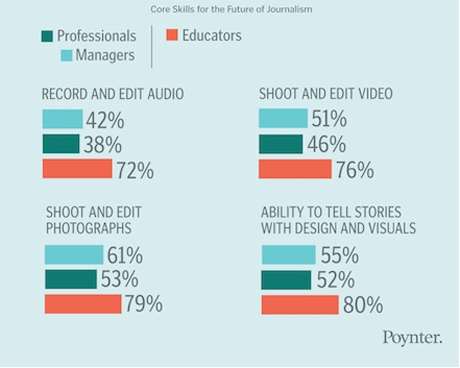
As Freshers' Week hangovers settle and the first assignments begin to mount, journalism students around the world should be settling into the groove of university life.
But how can you make the most of your time on a journalism course? We spoke to some leading educators to get their advice.
Get out of your comfort zone
On his Magazine Journalism course at Solent University, Iestyn George encourages all his students to start reading much more widely right from the start of their course.
"Most students' consumption of newspapers and magazines is based on what's in the house and what their family or friends like," he said, "but journalists need to read widely to understand different styles and voices to develop their own.
Find a passion, a specialism
"Be good at everything and an expert at one thing"' is a mantra George tries to instil in his students from the start, reinforcing the idea of reading widely to have a broad base of knowledge.
But having a specialism – be it a passion or a previous area of study – can be just as important.
"I definitely try to home in on individual skills of students as soon as possible," he said, "because there are always newspapers or magazines or writers that you know will appeal to them if you know what their interests are."Show that you know how to develop stories around a specific beat, how to develop a community around a particular topicClare Cook, University of Central Lancashire
Students fresh from school may not have developed the knowledge base for what can yet be called a 'specialism', or may not even know where their true passions lie, said George.
But reading widely from an early stage can help to uncover new subject areas or topics that excite and inspire.
"The core point is for that person to have reflected on where they want to go and for whom they would like to work," said Clare Cook, a lecturer in print and online journalism at the University of Central Lancashire.
"Do they want to work for anybody or do they want to be self employed? It's actually having that self awareness to really think about what matters to them and how they see that translating into the world of journalism and media."
Students who land their dream job immediately out of university are rare, but developing the skills that come with having a specialism can be central in getting there.
When Cook began her career in the local press, she became the paper's education correspondent despite having no real background in the area.
The point though is in "showing that you know how to develop stories around a specific beat, how to develop a community around a particular topic", she said, and proving that you know how to build contacts and stories.
Focus on the core skills

Screengrab from Poynter's Core Skills for the Future of Journalism report
As journalism faces continued digital disruption, technical skills for working online are in demand at many news organisations.
This can be a useful ability for some students to have, but no specialism should come at the expense of the core skills, said Professor George Brock, who recently stepped down as head of journalism at City University and spent 28 years in a variety of senior editorial roles at The Times.
"However much disruption is going on in journalism, however much the platforms are changing and the context of the industry is being turned upside down, [employers] still want somebody who can identify a story, research it and then project it," he said.
So even if a student has in-depth knowledge of international finance or the influence of colonialism on modern pop music, it is worth nothing to a news organisation if they can't quickly, effectively and accurately write about those topics.
"I'd add to that things which may not appear quite in this form on the curriculum but may appear in the newsroom," said Brock.
"How to be charming and persuasive when you're trying to get information out of someone that they don't really want to give you."
Working well in a team is also vital, said Brock, and "effective, creative teamwork" is the track on which good newsrooms run.
There are core digital skills too, of course. Community management – in terms of finding and engaging with people on social media – is vital, said Cook, and basic media editing skills will also be valuable in the newsroom.
"You need to know how to get the most out of your mobile phone in terms of recording little bits of video and audio," she added, "and doing that a little bit more creatively.
"That might be JamSnap, it could be using Snapchat in a different way but really engaging with those tools as a professional practice tool is really key.
"I think thirdly it would just be understanding how to write really good stories and make different packages work creatively... Being really creative with the tools, really engaging yourself creatively with all the tools that are there."
But the best courses, and the best students, combine "new platforms, new context and what's happening", said Brock, "with skills that can only be described as timeless and have been important for a very long time."
Don't write-off shorthand

Smartphones allow journalists to quickly and easily record audio or video versions of interviews but, for some, shorthand is still a vital tool.
"I would say it depends what type of journalism you are thinking of going into," said Cook. "For traditional court reporting or hard news situations it's invaluable – and even beyond that it's just plain useful.
"But if you are interested in entrepreneurial journalism – digital and social – you will be far too busy live tweeting and Audioboo-ing to write shorthand."
And Brock pointed out that, although tape-recording may be easier, "finding a quote on a recording can be slower than skimming through shorthand in a notebook if you're grasp of it is particularly good".
He did warn that shorthand can take a lot of time and practice so "if you're really going to get shorthand up to 100 words-per-minute or more then something else is going to suffer", particularly if working on a short or busy course.
Develop an online presence
All good journalism courses will encourage their students to set up a blog and have an active presence on social media, but it is important to try and do something that is useful and relevant rather than just doing it to rivk the right boxes on your course.
"Don't just have a blog, have a blog with a point," said George. "There are a lot of blogs out there so find an angle, find something interesting."
A 'dear diary' style blog might be contemplative and an easy source of inspiration, but "they're not necessarily the kind of things that you would look for as a potential employer and it's very difficult to build an audience as well".Nowadays, if you are reporter, it doesn't matter what kind of platform or medium you are working on, people who you want information out of are going to Google you very quicklyGeorge Brock, City University
So focusing on a passion and specialism and thinking about how journalists and news organisations cover that topic could be a good starting point.
Students should also be thinking about their social media presence "right from the word go", said Cook, and building a professional presence on Twitter in terms of regular @mentions and links to interesting articles.
Most students will have an existing online presence, often focused on a very small, personal audience. But journalism is largely about trying to "structure information in the clearest and most accessible way", said Brock, sometimes for a global audience.
This takes discipline, practice and teamwork, he said, and a student's social media output will adapt and develop over time but it should still be relatively clean.
"Nowadays if you are reporter, it doesn't matter what kind of platform or medium you are working on, people who you want information out of are going to Google you very quickly," he said, "and if they find something that alarms them then your chances of gaining information or access are going to fall."
Cook recommended online portfolio sites like Flavors.me, Clippings.me and DoYouBuzz for collecting published articles, or using curation boards like Spundge or Scoop.it, but the point is to find out what is comfortable and useful for certain needs.
"What an employer is going to want to see is that discipline that [students] understand what it is like to write and curate content on a weekly basis around themes, around beats," she said.
"So as soon as students can get their heads round actually doing journalism rather than talking about doing journalism that's for the best."
Look into work experience early
It is never too early to apply for work experience, as sometimes the process can take months, and even if the first application ends in rejection then it is an experience that can be learned from, said Cook.
"If you want to be more employable as a journalist after a course, [undergraduate] or post-grad, you have to have the aim of getting as much possible practice, perhaps of the greatest possible variety, in the time you have available," agreed Brock.
That said, he has also seen some students exhaust themselves at City University by giving themselves a relentless schedule of study and work. Finding a balance is key to making the most of opportunities.
These tips on getting your first work experience placement may be handy too.
Know the industry
With the wealth and breadth of different jobs available in the profession – startups, sub-editing, hard news reporting, newswires – Cook said it is important to take the time to understand the industry and where you might fit in.
But "learning how to innovate in disruptive contexts" is something journalists can no longer avoid, said Brock.
"The more navigational skills you have for the industry on the whole and what the important new developments are then the more likely you are going to be able to see and exploit career opportunities that come up."
Always think about sources
As the saying goes, a journalist is only as good as their sources
"There's a real skill in networking and there's a mistake that people make that networking is done around specific events or times," said Cook. "Networking needs to happen all the time."
Knowing who to connect with on social media and making or following lists on Twitter can help find work experience opportunities or jobs being advertised, she said, but it isn't all hob-nobbing with the editor-in-chief.
Journalists should always try to build a web of connections that can feed into stories.
"It can be around structured events but equally around something informal like a Christmas party or even meeting friends at university.
"The point is about filing those people in some sort of order so that when you need a nurse or a bricklayer or a dentist then you've got some way of saying 'this is when we last met, this is how I know you, is there anyway you can help me out'."
Free daily newsletter
If you like our news and feature articles, you can sign up to receive our free daily (Mon-Fri) email newsletter (mobile friendly).
Related articles
- How can universities prepare young journalists for the industry?
- Growing the next generation of journalists, with Karen Fowler-Watt
- Six tips to improve the audio quality of your podcast
- Information literacy courses can help students tackle confirmation bias and misinformation
- US university wants to solve information crisis with media trailblazers









